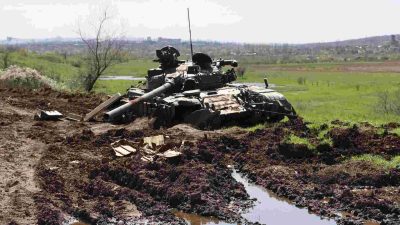Ukraine Lost Around 85% of Its Initial Mobilized Force: Field General
A Ukrainian combat general says of each 100 individuals conscripted last year only 10-20 remain while others are either dead or disabled.

All Global Research articles can be read in 51 languages by activating the Translate Website button below the author’s name.
To receive Global Research’s Daily Newsletter (selected articles), click here.
Click the share button above to email/forward this article to your friends and colleagues. Follow us on Instagram and Twitter and subscribe to our Telegram Channel. Feel free to repost and share widely Global Research articles.
***
Almost nine out of every ten Ukrainian draftees who enlisted in the army a year ago have either been killed or injured in combat, Ukrainian media reported on Friday citing a senior conscription officer in the Poltava Region.
Lt. Colonel Vitaly Berezhny, who is currently serving as the acting head of the territorial center for recruitment and social support, made this admission during a Poltava City Council meeting.
Sounding the alarm, Berezhny told meeting participants that “out of the 100 individuals who joined the units last fall, only 10-20 of them remain, the rest are dead, wounded or disabled.” Going from this statistic, he declared that the military was in urgent need of reinforcements.
He acknowledged that local authorities are facing significant challenges in their conscription efforts, having only achieved 13 percent of the mobilization plan. This places the Poltava at the bottom of the region’s rankings.
To address the shortage of manpower, the officer proposed the “establish the presence of conscripts.” He further stated that the region had intentions to establish a substantial mechanized brigade and appealed to local deputies to actively support this endeavor.
Following the start of the war with Russia in February 2022, Kiev implemented a general mobilization, barring most men between the ages of 18 and 60 from leaving the country. This measure was initially thought to suffice in meeting the country’s military manpower needs.
Former Ukrainian Defense Minister Alexei Reznikov revealed last month that Kiev had not yet fully executed its existing mobilization plan, indicating that there was no necessity for another conscription effort.
Nevertheless, at the beginning of this month, a significant policy shift occurred when the Ukrainian Defense Ministry issued a decree allowing the conscription of individuals with severe medical conditions, including hepatitis, asymptomatic HIV, and clinically managed tuberculosis.
This unexpected change in approach signaled a transformation in Kiev’s strategy for bolstering its military capabilities.
Simultaneously, the country’s authorities initiated a comprehensive anti-corruption campaign within the nation’s conscription framework. In recent developments, President Volodymyr Zelensky took resolute measures by terminating the appointments of all regional military conscription officials.
Berezhny’s recognition coincides with Ukraine’s ongoing counteroffensive, which has extended for over three months but has encountered difficulty in achieving substantial territorial gains despite full Western backing.
In recent days, Russian President Vladimir Putin estimated Ukraine’s military casualties to exceed 71,000 personnel. Additionally, he proposed that Kiev might consider engaging in negotiations with Moscow once its resources for confronting Russian defenses become critically depleted. Putin’s assessment emphasized that Ukraine would primarily seek talks to rehabilitate its weakened military capabilities.
*
Note to readers: Please click the share button above. Follow us on Instagram and Twitter and subscribe to our Telegram Channel. Feel free to repost and share widely Global Research articles.
Featured image is from InfoBrics

